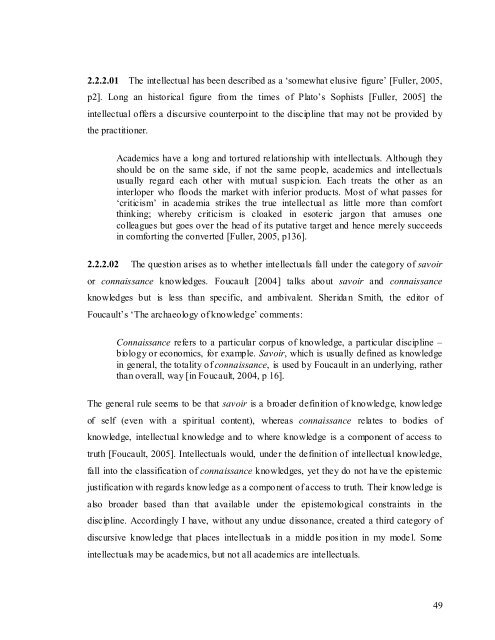Mapping the aliran of the academic discipline of entrepreneurship: A ...
Mapping the aliran of the academic discipline of entrepreneurship: A ...
Mapping the aliran of the academic discipline of entrepreneurship: A ...
You also want an ePaper? Increase the reach of your titles
YUMPU automatically turns print PDFs into web optimized ePapers that Google loves.
2.2.2.01 The intellectual has been described as a ‘somewhat elusive figure’ [Fuller, 2005,<br />
p2]. Long an historical figure from <strong>the</strong> times <strong>of</strong> Plato’s Sophists [Fuller, 2005] <strong>the</strong><br />
intellectual <strong>of</strong>fers a discursive counterpoint to <strong>the</strong> <strong>discipline</strong> that may not be provided by<br />
<strong>the</strong> practitioner.<br />
Academics have a long and tortured relationship with intellectuals. Although <strong>the</strong>y<br />
should be on <strong>the</strong> same side, if not <strong>the</strong> same people, <strong>academic</strong>s and intellectuals<br />
usually regard each ot her with mut ual suspicion. Each treats <strong>the</strong> ot her as an<br />
interloper who floods <strong>the</strong> market with inferior products. Most <strong>of</strong> what passes for<br />
‘criticism’ in academia strikes <strong>the</strong> true intellectual as little more than comfort<br />
thinking; whereby criticism is cloaked in esoteric jargon that amuses one<br />
colleagues but goes over <strong>the</strong> head <strong>of</strong> its putative target and hence merely succeeds<br />
in comforting <strong>the</strong> converted [Fuller, 2005, p136].<br />
2.2.2.02 The question arises as to whe<strong>the</strong>r intellectuals fall under <strong>the</strong> category <strong>of</strong> savoir<br />
or connaissance knowledges. Foucault [2004] talks about savoir and connaissance<br />
knowledges but is less than specific, and ambivalent. Sherida n Smith, <strong>the</strong> editor <strong>of</strong><br />
Foucault’s ‘The archaeology <strong>of</strong> knowledge’ comments:<br />
Connaissance refers to a particular corpus <strong>of</strong> knowledge, a particular <strong>discipline</strong> –<br />
biology or economics, for example. Savoir, which is usually defined as knowledge<br />
in general, <strong>the</strong> totality <strong>of</strong> connaissance, is used by Foucault in an underlying, ra<strong>the</strong>r<br />
than overall, way [in Foucault, 2004, p 16].<br />
The general rule seems to be that savoir is a broader definition <strong>of</strong> knowledge, knowledge<br />
<strong>of</strong> self (even with a spiritual content), whereas connaissance relates to bodies <strong>of</strong><br />
knowledge, intellectual knowledge and to where knowledge is a component <strong>of</strong> access to<br />
truth [Foucault, 2005]. Intellectuals would, under <strong>the</strong> definition <strong>of</strong> intellectual knowledge,<br />
fall into <strong>the</strong> classification <strong>of</strong> connaissance knowledges, yet <strong>the</strong>y do not ha ve <strong>the</strong> epistemic<br />
justification with regards knowledge as a compo nent <strong>of</strong> access to truth. Their knowledge is<br />
also broader based than that available under <strong>the</strong> epistemological constraints in <strong>the</strong><br />
<strong>discipline</strong>. Accordingly I have, without any undue dissonance, created a third category <strong>of</strong><br />
discursive knowledge that places intellectuals in a middle position in my mode l. Some<br />
intellectuals may be <strong>academic</strong>s, but not all <strong>academic</strong>s are intellectuals.<br />
49

















